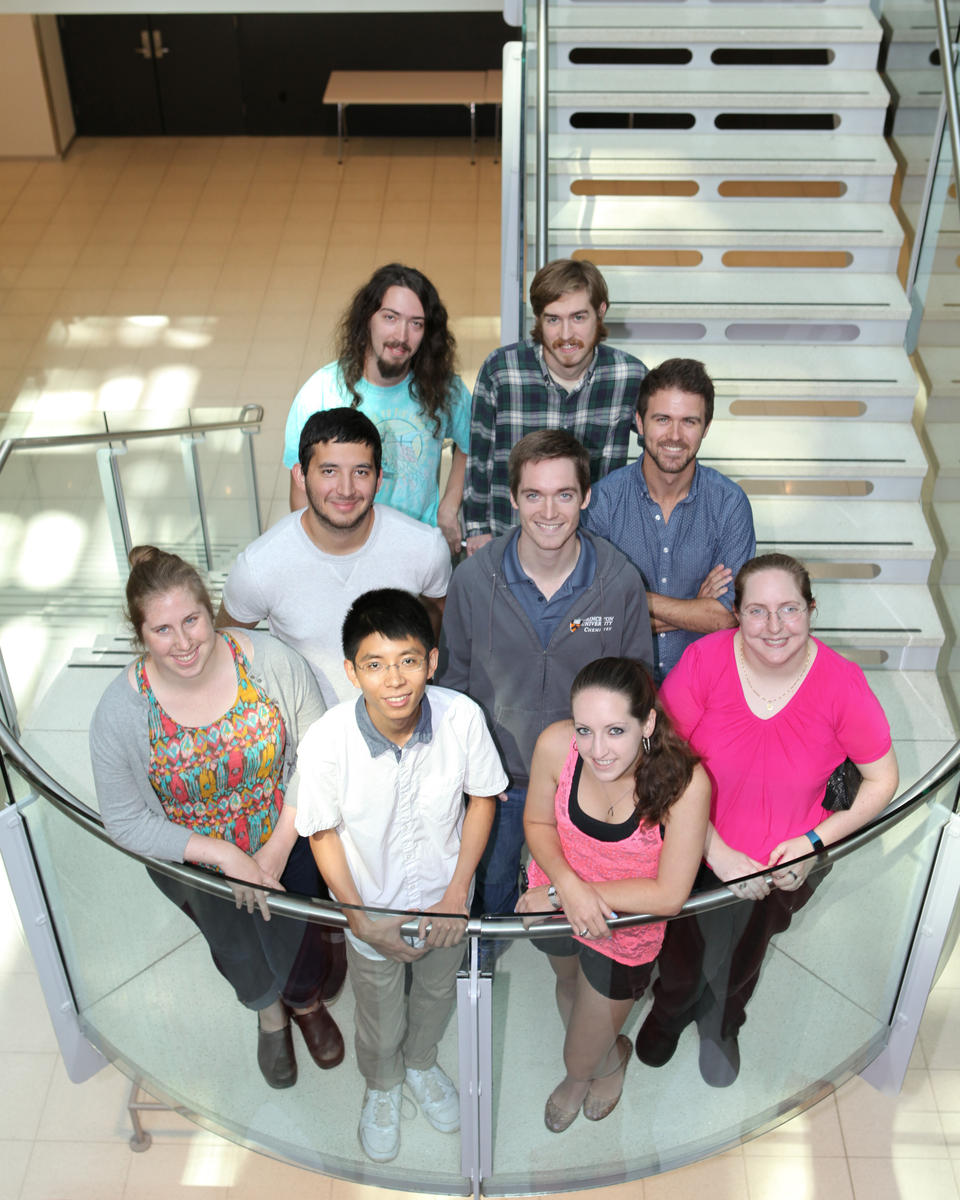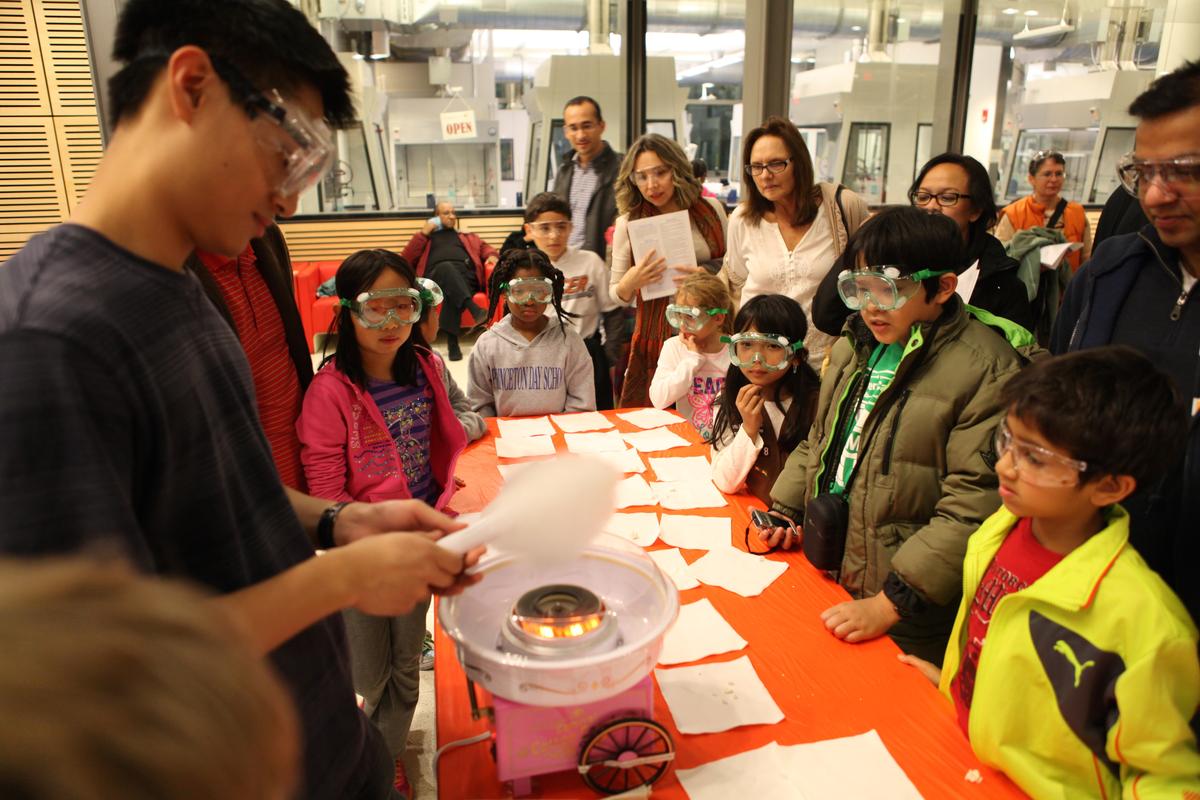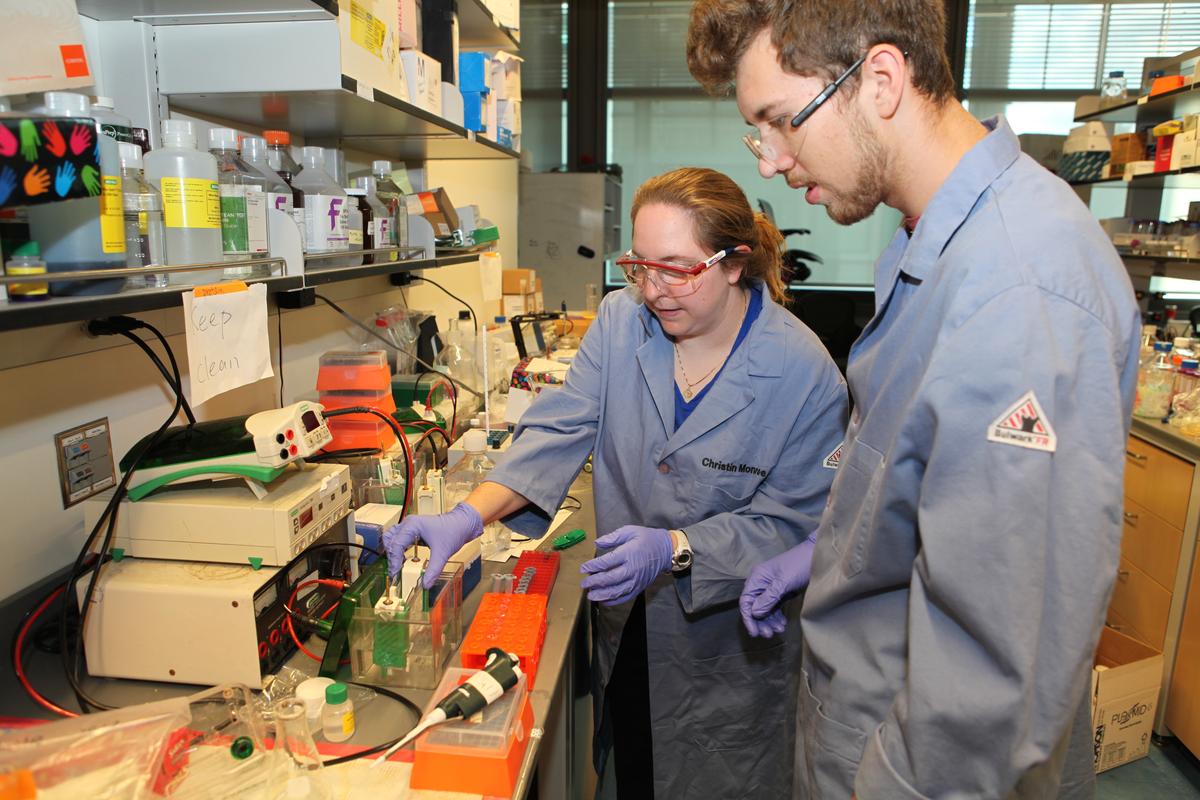Introducing Princeton Chemistry’s 2016 Graduate Student Organization Officers
From student-invited lectures to Friday socials, the Graduate Student Organization plays a valuable role in graduate life in the Department of Chemistry at Princeton University. The group is run by graduate students who are dedicated to building community and advocating for their peers’ collective personal and professional interests. We’ve asked this year’s GSO officers to share a bit about themselves, their science and how they hope to improve the graduate experience here in chemistry.
Why did you become a GSO Officer?
Aubrey Paris (Social Co-chair, 2nd year, Bocarsly lab, Ursinus College): I became a GSO officer because I think it’s really important for graduate students to have things to do and look forward to outside of the lab. I think that the GSO is perfectly poised to provide these opportunities to our grad student community, and I’m excited to be able to help make these activities and events come to fruition.

Dylan Abrams (Social Co-chair, 2nd year, Sorensen lab, University of Rochester): I became an officer because I saw that a lot of effort from a lot of previous students had been put into making this program a very unique experience for our graduate students, and I wanted to help to further that goal.
Duyu Chen (Career Lecture Series Co-chair, 5th year, Torquato lab, University of Science and Technology of China): As a GSO officer, I enjoy the opportunity to connect with fellow chemistry graduate students outside our lab.
Martin Rauch (Student Invited Lecture Series Co-chair, 3rd year, Knowles lab, Pennsylvania State): I’m the Student Invited Lecture Series Co-chair.
Bryan Kudisch (Outreach Chair, 2nd year, Scholes lab, Columbia University): I’m the Outreach Chair for the GSO, meaning that I both help coordinate graduate student involvement with larger scale, Princeton-wide events like our National Chemistry Week or the Young Women’s Conference chemistry demonstrations, as well as spearhead more department-centered initiatives like Chemistry Demonstration Saturdays at the Princeton Public Library. I’ve always been passionate about the role of a scientist as a communicator on top of their responsibilities as a researcher, and so naturally when I heard of the Outreach Chair position in the GSO, I knew it would allow me to stay close to reaching-out and hopefully inspire others to do the same.
Mia Borden (Student Invited Lecture Series Co-chair, 2nd year, Doyle lab, Carleton College): I wanted to be involved with the SILS committee because I really enjoy the SILS seminar series and I wanted to help facilitate these events.
Liz Carnicom (Secretary, 2nd year, Cava lab, Bucknell University): I joined the GSO to get more involved with the department.
Derek Ahneman (Career Lecture Series Co-chair, 5th year, Doyle lab, University of Delaware): I felt that students got a lot of exposure to work being done in academia, but not to many of the other career paths that Ph.D. chemists ultimately follow.
Peter Waddell (Graduate School Government Representative, 2nd year, Carrow lab, Rutgers University): I am the representative for the Department of Chemistry at the Graduate Student Government. As the name might suggest, I am responsible for attending the monthly GSG meetings and representing the interests of our department.
Christin Monroe (American Chemical Society Representative, 6th year, Groves lab, Misericordia University) : I joined GSO because I wanted to build stronger ties between graduate students and the Princeton section of the American Chemical Society.
Michael Nechayev (President, 2nd year, Hyster lab, University of California, Berkeley): When I was a first year, I felt like I benefited a lot from the social events organized by the GSO. They really helped me to meet more people outside my lab and become more comfortable in the department. At the same time, I saw potential to improve upon them even more and make them a more integral part of the graduate student experience in Frick. After a lot of my friends expressed interest in holding GSO officer positions, I thought it would be a great opportunity for me to work together with them to give back to the department.
What are you excited about bringing to the GSO and the chemistry department?
Monroe: I’m excited to help graduate students build professional connections through networking. I also enjoy connecting with younger scientists to help them gain a better understanding of the career options that exist when pursuing higher degrees in science.
Rauch: To continue to support the SILS program and improve/expand it.
Nechayev: I’m really excited to work with my committee and the staff to plan out our Orientation and Visit Weekends. I think there is room for more direct involvement from the graduate students. I also hope to draw more attention to the importance of mental health, and better connect students to helpful campus resources. Finally, I’m generally excited to work together with our officers to bring new outreach and career opportunities for the graduate community.
Carnicom: I’m excited to have ice cream socials and movie nights to get to know the incoming graduate students

Kudisch: I think that Princeton’s Chemistry Department does an amazing job at organizing activities and events for curious children and young adults in our community, and I look forward to both participating in these endeavors as a leader and serving as a liaison to the rest of the Frick graduate students and postdocs so that they can also feel the joy and sense of purpose from passing down their knowledge to our future scientists and critical thinkers. One type of initiative that I’m particularly excited for our department to grow into is digital outreach with nonlocal schools in underprivileged districts, which I will proudly say is currently in the works!
Borden: I am hoping help put together a diverse array of seminar speakers to share a variety of science.
Abrams: Initially, we were just working to maintain the existing social events, like the GSO Movie Night. I’m not sure what we’ll be working on next, but I really like the events that tend to bring students from many different labs together, especially when food is involved.
Chen: The Career Lecture Series.
Paris: When I got here in the fall of 2015, I became the unofficial “social chair” of my cohort, planning numerous outings ranging from group dinners to haunted house excursions and New York City adventures. I’d like to be able to expand these types of events, both on- and off-campus, to the greater grad student community. I hope that if any grad student has an idea for an event or excursion that they’ll chat with me about it so we can make it happen! The more unique the better!
Ahneman: Continuing to bring in speakers who can inform students and postdocs of opportunities outside of the academy.
Waddell: I would be interested in planning some more interesting activities during the visiting weekends for prospective graduate students, maybe something outdoorsy along the lines of a hike (weather permitting of course…).
What are you researching?
Waddell: My work involves developing new catalysts for the copolymerization of ethylene and polar co-monomers and trying to develop an understanding of what makes them work, ultimately discovering ways to make rational improvements to their design. I am also working on trying to accomplish a direct copolymerization of ethylene and carbon dioxide to make poly(ethylene)esters, a “dream reaction” which has never been successfully accomplished before.
Chen: We use computer simulation techniques to investigate disordered particle packings and employ various statistical descriptors to structurally characterize all kinds of heterogeneous materials, i.e., materials composed of different phases.
Borden: In my research, I am making ethers, which are an important functional group in biologically active compounds, using a nickel catalyst.
Abrams: Our group works on trying to develop fast and efficient routes to complex organic molecules which possess interesting biological and/or medicinal properties. I’m working on one such molecule.
Kudisch: I study what a molecule does after it absorbs light with a temporal resolution of a millionth of a billionth of a second, or femtosecond. While it may sound like an overkill in precision, this resolution in time allows us to answer some of the most difficult questions in disciplines as disparate as plant biology and electrical engineering. I specifically work on understanding a molecule which could serve as a model for an interface of an organic solar cell, trying to solve the puzzle of how exactly an electron jumps from one side of a molecule to the other, which is exactly how a solar cell transports the energy it gets from the sun to a battery.
Rauch: I work on photon upconversion. Trying to get UV-promoted reactions to work with visible light.
Paris: I’m an electrochemist who works on electrochemical CO2 transformation. Essentially, I am seeking to discover metal alloys that can act as catalysts to generate useful products from the abundant and rather useless molecule CO2. As an electrochemist, I use electricity as a driving force for the reaction.

Monroe: My research involves the study of how enzymes, or large three-dimensional molecular machines modify small chemicals. The 3D structure of enzymes allows them to perform reactions that chemists struggle to perform, typically under ambient conditions. Gaining a better understanding of how these enzymes are capable of performing these reactions allows us to 1) determine industrial uses for them and 2) gain information regarding how to mimic them with simpler compounds.
Ahneman: My previous research project involved using a combination of nickel and photoredox (light-driven) catalysts to modify carbon-hydrogen bonds. My current work is focused on using the calculated properties of molecules to predict the outcomes of catalytic reactions.
Nechayev: My projects revolve around designing bioengineered enzyme catalysts for modern, synthetic organic bond-forming reactions. I typically start by studying a contemporary reaction that suffers from poor selectivity, then modifying it to tolerate conditions in a protein environment, where I can then engineer the exact shape of the active site to confer higher selectivity.
Carnicom: I work on trying to make novel materials that have new and interesting properties.
Can you share a special talent that you possess?
Rauch: I don’t suffer from brain freeze and have won ice-cream eating contests as a result.
Borden: My special talent is that I can make a really flaky piecrust!
Kudisch: I can usually guess what time it is within 10 minutes of the actual time, even if I haven’t checked in a while! Can’t do it on the femtosecond timescale, though.
Carnicom: I really enjoy heavy lifting (squats, deadlifts, pull-ups etc.) and other exercising activities.
Abrams: I tend to wave at everyone, and I’m pretty good at getting people’s attention from far away (e.g. across the atrium). It’s pretty useful for getting people downstairs for social events.
Paris: I am a podcaster for the Institute on Science for Global Policy where I talk about a variety of science policy issues (e.g., food safety, infectious disease, climate change, synthetic biology) with two co-hosts. I therefore like to think that I’m pretty decent at science communication, and I’d love to use this experience to bring more science communication training opportunities to the GSO and our department!
Chen: Does “adventurous spirit” count? I am not afraid to reach out to people that I don’t know, which may be helpful when I try to bring in career lecture series speakers from different industries.
Ahneman: One trait that I have is a willingness to begin discussions about what we, as a community, should be trying to improve. For instance, the Career Series was initiated to overcome the lack of information graduate students and postdocs tend to have about non-academic career paths.
Monroe: My special talent involves connecting people with similar goals or interests. Through communications with different groups of people I have found ways of building relationships for myself and for those within my network.
Waddell: I am a pretty confident skier.
Nechayev: I can tap dance! I always have a sense of rhythm in my feet when I’m moving from place to place. I think this rhythm helps me stay focused and move between many different tasks, one at a time.
